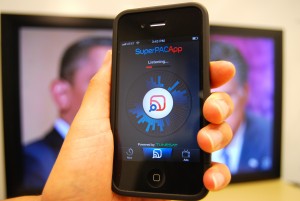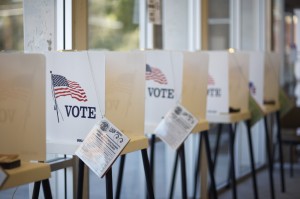Both the Obama and Romney campaigns are employing digital technology to outspend, outmaneuver, and outfox one another. Millions of dollars are being poured into data servers that collect your personal information in an attempt to determine whether you will commit money or votes. If Howard Dean pioneered the digital campaign in 2004 and Barack Obama took organizing online in 2008, then 2012 is the year that politics leveraged personal data for political gain.
But how has this technology helped the average citizen make informed decisions? Quite simply, it has not. There is a seismic imbalance between the frequencies at which technology is being used by campaigns for partisan bickering and by voters for practical purposes. Fortunately, social entrepreneurs are filling the void where government, corporations, and campaigns dare not venture.
The upcoming 2012 election could be a seminal moment, regardless of who ultimately controls Congress and the Presidency. The contest can permanently alter the way citizens utilize technology in the civic sphere, and several Harvard graduates, through startups they founded such as TurboVote and Super PAC App, are pioneering this effort. While these endeavors represent considerable progress though, there is more to come.
Easier Voter Registration
Seth Flaxman was fed up with the archaic system of voter registration. He was unable to exercise his civic voice because of registration regulations and inconveniences associated with mailing in required forms. He tells the HPR, “I just missed so many elections. I didn’t re-register. I couldn’t figure out how to vote by mail. Or I didn’t realize that an election had happened. Every conceivable way I could miss an election happened to me.”
Flaxman wanted to align 21st century technologies with the civic sphere, and saw Netflix as a model for how simple voting could become. The DVD rental service was a highly efficient system that served its customers like clockwork, mailing its customers with DVDs and prepaid return envelopes. Flaxman and his cofounder Kathryn Peters adapted this model for TurboVote while attending the Kennedy School of Government in 2010.
Voters can fill out all the necessary information online and TurboVote will complete the paperwork, mailing you the necessary documentation along with a pre-stamped and addressed envelope. The service can also send emails and text messages with alerts concerning upcoming deadlines and contests. Flaxman comments, “We’re trying to modernize voting for the way we live to get people reengaged with our democracy.”
Between the 2010 midterm elections and the beginning of this year’s presidential contest, TurboVote became a fully-fledged online registration tool servicing 54 college campuses across the country, including Harvard. Furthermore, the organization hopes to continue expanding and become the default mechanism for how people register to vote and apply for absentee ballots.
Despite TurboVote’s success though, it confronted its fair share of startup challenges. Flaxman stated, “The initial challenges were the same challenges faced by anyone starting a social enterprise. ‘How do you build your team?’ ‘What do you do next?’ ‘How do you get traction?’” Nevertheless, the organization quickly internalized best practices to answer those questions.
TurboVote’s founding predated the Harvard’s Innovation Lab and the establishment of the Harvard Presidential Public Service Fellowship Program. Today though, both ventures support dozens of startups annually, including those that aimed at public service. The Innovation Lab helps new enterprises find mentors, procure funding, and even apply for workspace. Meanwhile, the Presidential Fellowship gives students financial freedom to pursue nonprofit projects that improve civic discourse, providing up to $5,000 for undergraduate and $8,000 for graduate students. Harvard has become an environment conducive to civically minded startups, and as the university continues to foster collaboration between its schools and develop partnerships between the public and private sectors, we can expect to see more startups like TurboVote emerge.
Seeking Truth in Political Advertising
While Jennifer Hollett attended the Kennedy School, she received inspiration for a startup from another university in Cambridge. She was taking a class entitled “Social Television” at MIT’s Media Lab this past spring when she developed a project that would capitalize on mobile technology to educate voters.
 Hollett knew that super PACs would play an inordinate role this election cycle given their clandestine nature and incredible fundraising capacity. She wanted to improve political transparency by shining a light on their television advertisements and ultimately developed an application. By holding up a smartphone and recording the commercial’s audio, anyone can identify the Super PAC behind the advertisement, whom they support, and how much money they have raised.
Hollett knew that super PACs would play an inordinate role this election cycle given their clandestine nature and incredible fundraising capacity. She wanted to improve political transparency by shining a light on their television advertisements and ultimately developed an application. By holding up a smartphone and recording the commercial’s audio, anyone can identify the Super PAC behind the advertisement, whom they support, and how much money they have raised.
Her peers and professors were impressed by the idea’s potential, encouraging her to develop the Super PAC App full time. “It was a now or never moment,” she told the HPR. After receiving funding from the Knight Foundation, assembling a team, and working through the summer, the application was ready for marketing the week before the Republican National Convention.
The response has been positive so far: “We received a warm reception from both conventions—from journalists, delegates, people who lived in both cities and just interested in learning about our app,” said Hollett. “We wanted to create an app so that people could tune in and engage with what’s going on.”
Hollett entered the Kennedy School’s mid-career program after a journalistic career covering both digital media and politics. By founding Super PAC App, she combined these experiences and made a difference in society, providing voters with a powerful tool for making informed decisions on Election Day. She states, “Without civic engagement, we have a broken system.”
Election 2016 and Beyond
Creating a profitable startup is difficult enough, despite the potential for support by venture capital and private equity firms. The odds for success are even smaller for TurboVote and Super PAC App, which aim to maximize social good, not profits. How can the country move forward and reform the political process without typical business incentives?
For one, TurboVote and Super PAC App are blazing trails for the next generation of social entrepreneurs. TurboVote adapted an existing private sector business model for political purposes, and Super PAC App provided a model for startups to cooperate with universities and foundations to create low-cost, high-impact tools. Harvard is also making concerted efforts to help students turn their ideas into reality through the Innovation Lab and Presidential Fellowship. Following these examples will help students build the tools that will impact future elections. As Hollett aptly concludes, “I think that we’re defining politics in new ways and technology is creating new opportunities to engage and educate voters… we’re going to see many more in the years ahead.”
